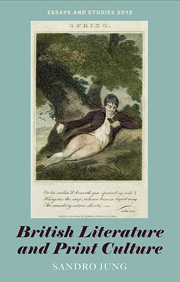Book contents
- Frontmatter
- Contents
- List of Illustrations
- Notes on Contributors
- Introduction
- Tracing a Genealogy of Oroonoko Editions
- The Pilgrim's Progress, Print Culture and the Dissenting Tradition
- Printing for the Author in the Long Eighteenth Century
- Robert Burn's Interleaved Scots Musical Museum: A Case-Study in the Vagaries of Editors and Owners
- Packaging, Design and Colour: From Fine-Printed to Small-Format Editions of Thomson's The Seasons, 1793–1802
- Print Illustrations and the Cultural Materialism of Scott's Waverley Novels
- Beyond Usefulness and Ephemerality: The Discursive Almanac, 1828–60
- The Last Years of a Victorian Monument: The Athenaeum after Maccoll
- Index
Tracing a Genealogy of Oroonoko Editions
Published online by Cambridge University Press: 05 October 2013
- Frontmatter
- Contents
- List of Illustrations
- Notes on Contributors
- Introduction
- Tracing a Genealogy of Oroonoko Editions
- The Pilgrim's Progress, Print Culture and the Dissenting Tradition
- Printing for the Author in the Long Eighteenth Century
- Robert Burn's Interleaved Scots Musical Museum: A Case-Study in the Vagaries of Editors and Owners
- Packaging, Design and Colour: From Fine-Printed to Small-Format Editions of Thomson's The Seasons, 1793–1802
- Print Illustrations and the Cultural Materialism of Scott's Waverley Novels
- Beyond Usefulness and Ephemerality: The Discursive Almanac, 1828–60
- The Last Years of a Victorian Monument: The Athenaeum after Maccoll
- Index
Summary
On the title page of the fifth edition of Aphra Behn's collected novels (1705), someone added the tag ‘Corrected from the many Errors of former Impressions’. Whether the phrase was inspired by a sense of pride in work well done or, more likely, a desire to advertise the book's superiority, it advises the modern reader of a number of important things. First, it tells us that the 1705 edition succeeds a number of previous editions, informing us that Behn's novels have a history, a textual history that involves errors. The language refers to the physical action of the hand-press, and it reminds us of those individual hands that set the type that formed the impressions remaining on the page today. The phrase underscores the fact that the text we receive underwent changes well after Behn's death in 1689. Most importantly for this essay, its claim testifies to a widespread and largely unacknowledged textual practice in the transmission of Aphra Behn's most famous short fiction, Oroonoko.
Over the course of the eighteenth century, various hands anonymously ‘corrected’ and ‘improved’ Behn's text in a gradual accretion of extensive textual corruption. Given the pedagogical prominence Oroonoko has assumed in the past twenty years and its overwhelming presence in literary scholarship of the seventeenth and eighteenth centuries, a fitting subtitle to this article might be: ‘The Hazards of Choosing an Edition’. As Gerald Duchovnay and Mary Ann O'Donnell have documented, the publication of Oroonoko in 1688 was far from free of problems.
- Type
- Chapter
- Information
- British Literature and Print Culture , pp. 5 - 32Publisher: Boydell & BrewerPrint publication year: 2013

